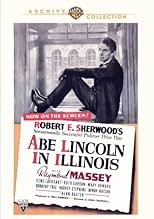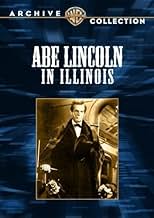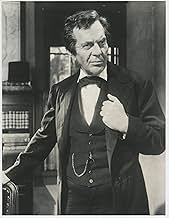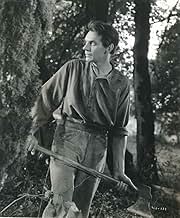IMDb-BEWERTUNG
7,3/10
2196
IHRE BEWERTUNG
Füge eine Handlung in deiner Sprache hinzuHumble Abraham Lincoln gains the respect of his Illinois neighbors, growing in stature and respect until he is elected President in 1860 and departs for Washington.Humble Abraham Lincoln gains the respect of his Illinois neighbors, growing in stature and respect until he is elected President in 1860 and departs for Washington.Humble Abraham Lincoln gains the respect of his Illinois neighbors, growing in stature and respect until he is elected President in 1860 and departs for Washington.
- Für 2 Oscars nominiert
- 2 Gewinne & 2 Nominierungen insgesamt
Howard Da Silva
- Jack Armstrong
- (as Howard da Silva)
Empfohlene Bewertungen
This film portrays Abe Lincoln's political rise as a man of the people, from his wrestling brawl with town bully Howard da Silva to his failure as a general store owner and his humble beginning in politics as a town postmaster. The film portrays the women in Lincoln's life and the influence they had on him. Perhaps the most influential woman is the one not shown, his mother, but he shares a moving scene with his step mother as he's leaving home, and then with Ann Rutledge, and finally with Mary Todd played in an unusually interesting way by Ruth Gordon. It's perhaps the influence of these women and their uncertain fates that more than balanced Lincoln's well developed humor with a dark and secret melancholy. That aspect is captured through some of the scenes of Massey's Lincoln shot by legendary cinematographer James Wong Howe. Between him, Massey, and Ruth Gordon, this film seems to carry some serious cinematically induced psychological influences.
I have seen this film probably 15 times or more and have been a devotee of the Lincoln mythology (for lack of a better term) for nearly 20 years. I remember first seeing the film as a youngster on the same weekend as the death and funeral of President Kennedy in November of 1963. At that time, the two scenes that struck me as most memorable to my young mind was the one where the local woman tells Lincoln that he is the homeliest man in the county; and, the other scene where Lincoln is telling the slightly off-color joke to a crowd about the man fighting the bear. Also, another visual that sticks in my memory is the somewhat haunting scene where Lincoln revisits New Salem after the once thriving city has become a ghost-town.
There are several marvelous aspects of this movie. To begin with, is the near perfect physical and emotional representation of Lincoln by Raymond Massey. Given the photographs of the pre-president Lincoln, making Massey into sixteenth president seems nearly ordained from the beginning. The height, facial structure, and body type is nearly a perfect fit. Regarding how Lincoln spoke, it is hard to determine if that is an accurate representation or not. Historical accounts of Lincoln says that he had a rather high and not necessarily soothing voice. Since, it would be another 30 plus years before there is any kind of recording device, Massey's voice should seem appropriate enough.
Additionally, the cinematography is excellent. The on-location or natural shots are superior by black and white standards. Even though I am a devotee of black and white films, color films seem to have the upper hand when filming wide-open or rustic environments. The feel of the indoor scenes such as the ones within the Lincoln Springfield home is nearly perfect for the times. You can virtually smell the cigar smoke or the burning wood stove. Finally, the lighting during the campaign speech scenes are awesome.
But, the best part of the movie is how even with some artistic license the characters surrounding Lincoln are historically strong and represent in a film microcosm a very accurate historical reality of Lincoln's early years. For example, starting with Ruth Gordon's portrayal of Mary Linoln Todd. With her character, you can easily feel how much she effected Lincoln. Her persistent pressure on Lincoln to achieve political importance and her hard-nose, sometimes loving, sometimes bitter prescience is from my historical reading just about perfect. Since the film takes place before Lincoln is actually president, Mary Todd Lincoln's shenanigans within the White House or her emotional unraveling in her later years is not an issue here.
The romance demonstrated between Lincoln and Ann Rutledge, although later to be historically challenged, then even later to be considered historically (possibly) significant, is quite sadly moving. It is nicely juxtaposition-ed against the image of Mary Lincoln Todd.
Howard De Silva as New Salem's local ruffian is although somewhat embellished, still represents Lincoln's ability to relate to people from all walks of life. The film just seems to find the vital essence of young Lincoln before he became president.
The surreal, final scene of Lincoln leaving Springfield for Washington D.C. (again although actually happening during the day during a rainstorm)after giving one of his many great historical speeches ("this is where I have lived") catches the eerie but profound feel of how important his leadership is going to mean to the struggling republic. The playing of the "Battle Hymnn of the Republic" although premature, is still simple perfect.
There are several marvelous aspects of this movie. To begin with, is the near perfect physical and emotional representation of Lincoln by Raymond Massey. Given the photographs of the pre-president Lincoln, making Massey into sixteenth president seems nearly ordained from the beginning. The height, facial structure, and body type is nearly a perfect fit. Regarding how Lincoln spoke, it is hard to determine if that is an accurate representation or not. Historical accounts of Lincoln says that he had a rather high and not necessarily soothing voice. Since, it would be another 30 plus years before there is any kind of recording device, Massey's voice should seem appropriate enough.
Additionally, the cinematography is excellent. The on-location or natural shots are superior by black and white standards. Even though I am a devotee of black and white films, color films seem to have the upper hand when filming wide-open or rustic environments. The feel of the indoor scenes such as the ones within the Lincoln Springfield home is nearly perfect for the times. You can virtually smell the cigar smoke or the burning wood stove. Finally, the lighting during the campaign speech scenes are awesome.
But, the best part of the movie is how even with some artistic license the characters surrounding Lincoln are historically strong and represent in a film microcosm a very accurate historical reality of Lincoln's early years. For example, starting with Ruth Gordon's portrayal of Mary Linoln Todd. With her character, you can easily feel how much she effected Lincoln. Her persistent pressure on Lincoln to achieve political importance and her hard-nose, sometimes loving, sometimes bitter prescience is from my historical reading just about perfect. Since the film takes place before Lincoln is actually president, Mary Todd Lincoln's shenanigans within the White House or her emotional unraveling in her later years is not an issue here.
The romance demonstrated between Lincoln and Ann Rutledge, although later to be historically challenged, then even later to be considered historically (possibly) significant, is quite sadly moving. It is nicely juxtaposition-ed against the image of Mary Lincoln Todd.
Howard De Silva as New Salem's local ruffian is although somewhat embellished, still represents Lincoln's ability to relate to people from all walks of life. The film just seems to find the vital essence of young Lincoln before he became president.
The surreal, final scene of Lincoln leaving Springfield for Washington D.C. (again although actually happening during the day during a rainstorm)after giving one of his many great historical speeches ("this is where I have lived") catches the eerie but profound feel of how important his leadership is going to mean to the struggling republic. The playing of the "Battle Hymnn of the Republic" although premature, is still simple perfect.
Abe Lincoln is one of the most misunderstood figures in American history--perhaps THE most misunderstood. So much of what we assume are facts are actually myths and misrepresentations--some of which were promoted by writers and some by films of the 30s and 40s. While ABE LINCOLN IN ILLINOIS is far from perfect, it is light-years ahead of the other contemporary works in giving a balanced account of Lincoln's life. While heroic in many ways, Lincoln is more of a man in this film and the facts are generally true--and that's a lot more than can be said of such sentimental hogwash as D.W. Griffith's 1930 fiasco ABRAHAM LINCOLN--which is basically one myth after another strung together!! I can say all this because I am well educated about the man and am an American history teacher--so my opinion should mean something.
One of the common myths that has abounded was the Ann Rutledge romance. While it's uncertain exactly how much they were in love (was it just a passing romance or something deeper), it's obvious that they were NOT as they were portrayed in ABRAHAM LINCOLN with all of its syrupy sweetness. Read up on the controversy yourself--opinions vary and there's no concrete evidence to prove either extreme. Here in ABE LINCOLN IN ILLINOIS, they seem to take the position that the love between them was just beginning to blossom when she died and that that was about it.
Another myth is that Lincoln was 100% against slavery and that he personally freed the slaves (that was actually done by Congress and the 13th amendment). The real life Lincoln, though opposed to slavery, was more concerned with unity and preserving the nation. Fortunately, ABE LINCOLN IN ILLINOIS gets this right--they show Lincoln as being torn by these two divergent interests. Most books and films portray him as "the Great Emancipator"--though Lincoln would have allowed slavery to keep the country from war and he did see class distinctions between the races.
The other big myth is that Lincoln was sort of a "dumb hillbilly" and that he stumbled into greatness. While in this film he is a simple man, of sorts, he also is amazingly clever and has a great way with dealing with people. And, occasionally, he was a bit devious. While the film doesn't have a chance to show his political savvy and willingness to "forget" the Constitution during the war in order to keep the country together, he is relatively shrewd in this film.
As for Mary Todd, in the film as in real life, she was a conniver and a very unstable woman. While her mental instability was only briefly shown in this film (as in reality--her mental condition greatly deteriorated after her husband was President as well as his death) but at least it was mentioned. Plus, her intense drive was a major focus of the film--as it was in Lincoln's own real life. She was a hard-driving and rather nasty woman if you read more about her (and rather mentally unstable in her later years).
As a long-winded teacher, I could go on, but probably should wrap it up now. The film is reasonably accurate and tends to show Lincoln, warts and all--something films up until then neglected. Additionally, Raymond Massey's performance was superb and the film was both entertaining and inspiring. Interestingly enough, Massey was a Canadian and did a much better job than the Americans who have tackled this role.
One of the common myths that has abounded was the Ann Rutledge romance. While it's uncertain exactly how much they were in love (was it just a passing romance or something deeper), it's obvious that they were NOT as they were portrayed in ABRAHAM LINCOLN with all of its syrupy sweetness. Read up on the controversy yourself--opinions vary and there's no concrete evidence to prove either extreme. Here in ABE LINCOLN IN ILLINOIS, they seem to take the position that the love between them was just beginning to blossom when she died and that that was about it.
Another myth is that Lincoln was 100% against slavery and that he personally freed the slaves (that was actually done by Congress and the 13th amendment). The real life Lincoln, though opposed to slavery, was more concerned with unity and preserving the nation. Fortunately, ABE LINCOLN IN ILLINOIS gets this right--they show Lincoln as being torn by these two divergent interests. Most books and films portray him as "the Great Emancipator"--though Lincoln would have allowed slavery to keep the country from war and he did see class distinctions between the races.
The other big myth is that Lincoln was sort of a "dumb hillbilly" and that he stumbled into greatness. While in this film he is a simple man, of sorts, he also is amazingly clever and has a great way with dealing with people. And, occasionally, he was a bit devious. While the film doesn't have a chance to show his political savvy and willingness to "forget" the Constitution during the war in order to keep the country together, he is relatively shrewd in this film.
As for Mary Todd, in the film as in real life, she was a conniver and a very unstable woman. While her mental instability was only briefly shown in this film (as in reality--her mental condition greatly deteriorated after her husband was President as well as his death) but at least it was mentioned. Plus, her intense drive was a major focus of the film--as it was in Lincoln's own real life. She was a hard-driving and rather nasty woman if you read more about her (and rather mentally unstable in her later years).
As a long-winded teacher, I could go on, but probably should wrap it up now. The film is reasonably accurate and tends to show Lincoln, warts and all--something films up until then neglected. Additionally, Raymond Massey's performance was superb and the film was both entertaining and inspiring. Interestingly enough, Massey was a Canadian and did a much better job than the Americans who have tackled this role.
Episodic recounting of Lincoln's life up to the Presidency. Written by Robert Sherwood, one of FDR's speechwriters. Good performances by Ruth Gordon, Alan Baxter, Howard DaSilva, Clem Bevans.
Massey is the definitive movie Lincoln. Excellent work, emotional range and depth. Much better than Henry Fonda, whose Lincoln was apparently in some kind of trance.
May seem a little dated to modern audiences; occasionally strives for emotional poignancy that now comes across as somewhat corny.
Lots of little details, good depictions of frontier life, political campaigns in the 1800's. Includes two of Lincoln's best speeches from that period, with Massey's performance very close to Lincoln's 19th century oratorical style.
Highly recommended to students of American history and fans of old movies.
Massey is the definitive movie Lincoln. Excellent work, emotional range and depth. Much better than Henry Fonda, whose Lincoln was apparently in some kind of trance.
May seem a little dated to modern audiences; occasionally strives for emotional poignancy that now comes across as somewhat corny.
Lots of little details, good depictions of frontier life, political campaigns in the 1800's. Includes two of Lincoln's best speeches from that period, with Massey's performance very close to Lincoln's 19th century oratorical style.
Highly recommended to students of American history and fans of old movies.
Besides Raymond Massey, a whole flock of actors have been known for playing America's sixteenth president, Henry Fonda, Walter Huston, Sam Waterston, Hal Holbrook, Dennis Weaver, Gregory Peck, John Carradine. Character actor Frank McGlyn practically made a career of playing The Great Emancipator whenever Honest Abe was a character in a film. But the standard has been set by Raymond Massey who did Lincoln in Robert Sherwood's play for 472 performances on Broadway during the 1938-1939 season and he repeats the title role in Abe Lincoln in Illinois for this film version.
I've no doubt that Sherwood used as source material for his play a lot of information based on Carl Sandburg's biography, Lincoln the Prarie Years. At that time Sandburg was considered the unofficial custodian of the Lincoln legend and mythology. Of course he based a lot of his work on the biography of Lincoln written by his law partner William Herndon played here by Alan Baxter. Herndon's well known antipathy for Mary Todd Lincoln as the shrewish wife of his good friend comes through her in Ruth Gordon's portrayal. It should be said that Mary Lincoln regarded Herndon as an opportunist drunk and he certainly did have a substance abuse problem.
Gene Lockhart as Lincoln's rival Stephen A. Douglas is well done also, though Lockhart was a bit tall for the part. Had Douglas ever been elected president he would have been our shortest president, he was barely over five feet tall. The rivalry between these two was kind of like the Yankees and Red Sox with the Yankees always coming out on top until recent years. Lincoln is still our tallest president at 6'4" so the contrast on the speaking platform at the Lincoln-Douglas debates was really something to see.
The only other actor to recreate his stage role besides Massey was Howard DaSilva who played Jack Armstrong. Not the All American hero, but the leader of the local gang of roughnecks who Lincoln beat in a wrestling match and who becomes his lifelong friend. All part of the Lincoln legend carefully preserved by Sandburg and Sherwood. It was one of DaSilva's earliest screen roles.
Raymond Massey got an Academy Award nomination for Best Actor in 1940 and he was up against a strong field that included Henry Fonda for The Grapes of Wrath, Charles Chaplin for The Great Dictator, and Laurence Olivier in Rebecca. The winner however was a long-shot, James Stewart for The Philadelphia Story. There was a lot of sentiment that year that Stewart should have received the Oscar the year before for Mr. Smith Goes to Washington. So the good Academy voters made up for it this year. It goes that way with Oscar every so often.
Abe Lincoln in Illinois still holds up very well although today's historical Lincoln specialists might have different interpretations placed on some of the events you see.
I've no doubt that Sherwood used as source material for his play a lot of information based on Carl Sandburg's biography, Lincoln the Prarie Years. At that time Sandburg was considered the unofficial custodian of the Lincoln legend and mythology. Of course he based a lot of his work on the biography of Lincoln written by his law partner William Herndon played here by Alan Baxter. Herndon's well known antipathy for Mary Todd Lincoln as the shrewish wife of his good friend comes through her in Ruth Gordon's portrayal. It should be said that Mary Lincoln regarded Herndon as an opportunist drunk and he certainly did have a substance abuse problem.
Gene Lockhart as Lincoln's rival Stephen A. Douglas is well done also, though Lockhart was a bit tall for the part. Had Douglas ever been elected president he would have been our shortest president, he was barely over five feet tall. The rivalry between these two was kind of like the Yankees and Red Sox with the Yankees always coming out on top until recent years. Lincoln is still our tallest president at 6'4" so the contrast on the speaking platform at the Lincoln-Douglas debates was really something to see.
The only other actor to recreate his stage role besides Massey was Howard DaSilva who played Jack Armstrong. Not the All American hero, but the leader of the local gang of roughnecks who Lincoln beat in a wrestling match and who becomes his lifelong friend. All part of the Lincoln legend carefully preserved by Sandburg and Sherwood. It was one of DaSilva's earliest screen roles.
Raymond Massey got an Academy Award nomination for Best Actor in 1940 and he was up against a strong field that included Henry Fonda for The Grapes of Wrath, Charles Chaplin for The Great Dictator, and Laurence Olivier in Rebecca. The winner however was a long-shot, James Stewart for The Philadelphia Story. There was a lot of sentiment that year that Stewart should have received the Oscar the year before for Mr. Smith Goes to Washington. So the good Academy voters made up for it this year. It goes that way with Oscar every so often.
Abe Lincoln in Illinois still holds up very well although today's historical Lincoln specialists might have different interpretations placed on some of the events you see.
Wusstest du schon
- WissenswertesAfter his success playing Lincoln in the film and on Broadway, Raymond Massey began to assume the character in real life. He often appeared at social gatherings dressed in Lincoln-esque attire, assuming a Lincoln-like manner and speech. His friend, the playwright George S. Kaufman, observed, "Massey won't be satisfied until someone assassinates him."
- PatzerWhen results for the 1860 election are being received, West Virginia is listed on the the state-by-state tally board. West Virginia didn't become a state until 1863, when it broke off from Virginia after that state had seceded from the Union.
- Zitate
Mentor Graham: Well, Abe, there are always two occupations open to those who have failed at everything else: school teaching and politics.
- VerbindungenFeatured in History Brought to Life (1950)
- SoundtracksOld Abe Lincoln Came Out of the Wilderness
(uncredited)
Traditional
Sung by chorus over opening credits
Top-Auswahl
Melde dich zum Bewerten an und greife auf die Watchlist für personalisierte Empfehlungen zu.
- How long is Abe Lincoln in Illinois?Powered by Alexa
Details
Box Office
- Bruttoertrag in den USA und Kanada
- 1.451.880 $
- Laufzeit1 Stunde 50 Minuten
- Farbe
- Seitenverhältnis
- 1.37 : 1
Zu dieser Seite beitragen
Bearbeitung vorschlagen oder fehlenden Inhalt hinzufügen

Oberste Lücke
By what name was Abe Lincoln in Illinois (1940) officially released in India in English?
Antwort





































